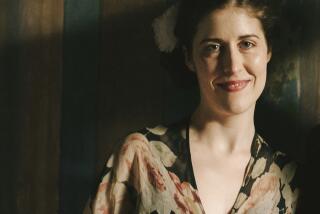BOOK REVIEW : A Repressed Heroine Keeps Those Hidden Desires Unfulfilled : A CLOSED EYE <i> by Anita Brookner</i> ; Random House $21; 256 pages
- Share via
Jack Peckham, a globe-trotting television journalist, can be thought of as the love interest in Anita Brookner’s latest novel, “A Closed Eye.” But he isn’t, really; he’s a symbol representing the love, indeed the life, that Harriet, Brookner’s principal character, never had, a man who constellates Harriet’s repressed emotions and who might just rescue her from a dull, enervated existence.
He doesn’t, of course, though mostly because of Harriet, who is able to love freely only her daughter, Imogene. No matter that Immy, as she grows up, becomes contemptuous, secretive, deceitful, imperious; she is Harriet’s one bright hope, a presence saturated with the spark and spirit that Harriet misses in her own life.
Harriet’s story, like those of most Brookner heroines, is singularly undramatic, overshadowed by the active, more engaged lives that surround her. Married off at an early age to Freddie, a much older businessman, Harriet never had the opportunity to experience life in any deep sense; her self-sufficient parents believed the best they could do was provide Harriet with a rich, undemanding husband, since a birthmark on her face seemed to make true love unlikely.
Harriet accepts her lot, having little choice in the matter, and becomes a more than competent wife, finding at least minimal diversion in books, a small, loose circle of female acquaintances, and sometimes in dreams.
Brookner’s narrative sets the stage for an awakening of some kind, but it proves neither particularly positive for Harriet nor particularly satisfying for the reader. Upon meeting Jack, recently married to Harriet’s friend Tessa, Harriet knows immediately that he is dangerous, difficult and unreliable, yet she soon imagines herself as his lover; Jack’s very existence is a reproach to her pale and empty life. Harriet is correctly convinced that Tessa will be destroyed by this relationship--Jack married Tessa only because she was pregnant with his child--but envies her nonetheless. Harriet realizes, with great anguish, that she will always be a virgin when it comes to love.
Jack continues to be a spectral presence in Harriet’s life, and years later, after Tessa’s death, she seeks him out on a pretext--giving clothes to Lizzie, Tessa’s daughter by Jack--and returns a hot-blooded kiss. That’s the extent of Jack’s role in “A Closer Eye,” however; he exists solely to force Harriet to feel her internal discontent.
The only other figure capable of affecting Harriet in any significant way is Imogene, and it’s her relationship with Harriet--and their individual relationships with Lizzie--that hold the reader’s interest. It’s this triangle, not the much more conventional one linking Harriet, Tessa and Jack, that keeps the novel going.
Immy and Lizzie suffer, in essence, from switched identities, for each seems much more suited to the other’s mother. Beautiful Immy flaunts the life force shown by Tessa and Jack; mouse-like Lizzie is reserved and old before her time, like Harriet and Freddie. Harriet does her best by Immy, but by the age of 10 the child so outshines her parents that they have become irrelevant to her life.
Lizzie’s parents are irrelevant to her life, too, but for reasons of death and abandonment, with the result that she seems an aging waif. Like the young Harriet, she becomes an underling in the book industry with few marital or professional prospects, the sort of person the world forgets.
Brookner indicates from the novel’s opening lines that the relationship between Harriet and Lizzie is significant, and she shows how Jack, then Immy, and finally Lizzie become receptacles for Harriet’s limited emotional life. Knowing early on that Harriet is tied to Lizzie in some odd way, the reader wonders what has happened to Immy, but that’s the only revelation to be awaited in this novel.
There’s some good writing here, but “A Closer Eye” ultimately doesn’t add up to much. We come to understand why Harriet turns to Lizzie after Immy and Freddie are gone, but there’s little sense of completion, of peacemaking, of a life story now making sense.
Early in her marriage, after Freddie warns her not to spend too much time with Tessa and Jack, Harriet describes herself as “a kind of facsimile, pleasant but inauthentic,” someone who might well “fade, vanish, before anyone had noticed her disappearance.” “In A Closed Eye” Brookner memorializes Harriet and those like her, and although it’s an admirable undertaking, it inevitably falls flat.
For Harriet there is no passage from inauthentic to authentic, from facsimile to genuine; she had her chance with Jack but elected not to change her life. The result isn’t tragedy but boredom, mild regrets, and a slow decline toward death, and those are not the ingredients of a compelling novel.
Next: Carolyn See reviews “Mercy” by Echo Heron (Simon & Schuster) .
More to Read
Sign up for our Book Club newsletter
Get the latest news, events and more from the Los Angeles Times Book Club, and help us get L.A. reading and talking.
You may occasionally receive promotional content from the Los Angeles Times.







